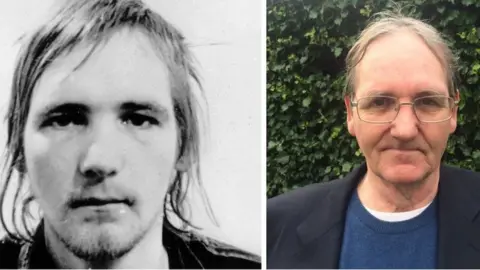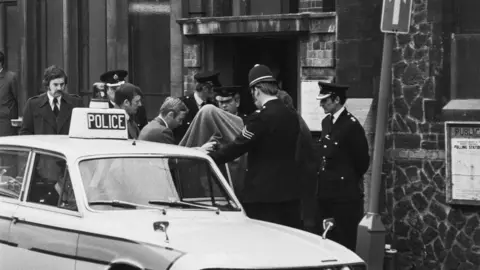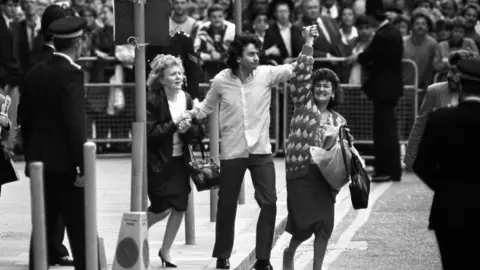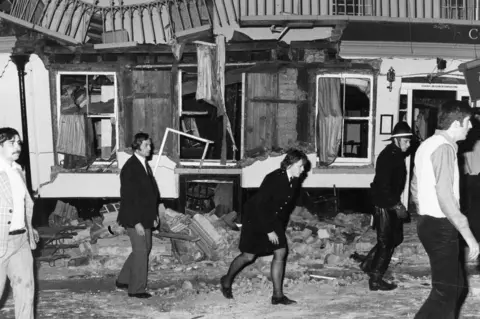Guildford pub bombs: Calls for release of IRA file as legacy bill looms
 BBC
BBCA man wrongly-jailed for the Guildford pub bombings in 1974 has demanded the release of a police report on the IRA that was compiled while he stood trial.
Guildford Four man Paddy Armstrong served 15 years in prison in one of the UK's biggest miscarriages of justice.
Decades on, families of the wrongly-convicted and relatives of victims want justice before a new law comes in that would help shield the perpetrators.
The Home Office said support was available to those who needed it.
No-one else was prosecuted over the attacks after the Guildford Four were freed in 1989. In 1976, IRA men Brendan Dowd and Joe O'Connell said they bombed Guildford with a man and two women who were not named. The BBC has seen their confessions.
The secret papers, known as the Habershon report, looked at the terror cell to which Dowd and O'Connell belonged. It covered its activities from August 1974 to February 1975, spanning the Guildford pub bombings on 5 October 1974.
Mr Armstrong said: "The continued refusal to allow public access to this report is only explicable as protection of the reputations of those responsible for the miscarriage of justice I suffered."
 Getty Images
Getty ImagesHis former lawyer Alastair Logan said the papers were closed because of the "criminal actions" of police and forensic scientists and a "breach of public duty" by the-then director of public prosecutions Sir Norman Skelhorn, who died in 1988.
Mr Logan, who has lodged an appeal with the Information Commissioner, believes the papers could show whether any informers provided the state with prior knowledge of the attacks.
The BBC was shown a copy of the 30-page report, confidentially, in 2021. Two people in the document have been named to the BBC as Guildford bombers and one as an informer, but the BBC has been unable to corroborate the claims. Evidence held in 41 supporting documents remains classified. The papers identify more than 30 IRA members.
Five people died and 65 were injured when the IRA detonated devices at two soldiers' pubs in Guildford.
Under the Northern Ireland bill, expected to become law before summer, perpetrators will be able to seek immunity from prosecution.
Bridie Brennan, sister of Gerry Conlon and daughter of Guiseppe Conlon, who were both wrongly-convicted, said the files were due to open in 2020 but stayed closed.
"They don't want us to see what's there," she said.
Mrs Brennan said she was still fighting for truth and justice for her family, adding: "It's not just about the innocence of Gerry and my daddy - it's for all those affected."
Her father died in prison, while her brother died in 2014.
 PA Media
PA MediaCassandra Hamilton, sister of Pte Ann Hamilton, one of four soldiers who died in the bombings, said 11 months passed between the Guildford attacks and Habershon's report on 25 September 1975 and asked why the IRA cell was not arrested sooner.
Her family still wanted to know who killed their sister, she said.
She said the report should have been included in last year's inquest. But the inquest did not have the scope to look at perpetrators, and Habershon was deemed irrelevant.

Analysis
The Northern Ireland legacy bill
Julian O'Neill, BBC Northern Ireland correspondent
The government's legacy bill covers Northern Ireland-related violence anywhere in the UK between 1966 and the signing of the Good Friday Agreement in 1998.
In its words, it seeks to draw a line under events of several decades ago.
Under the legislation, a new commission would be set up to provide bereaved families and victims with as much information as possible on incidents.
It would only launch investigations where it judges them "appropriate" and would offer all suspected perpetrators an amnesty if they co-operate.
As well as ending prosecutions in these circumstances, the bill would ban future inquests and civil actions.
Groups representing victims' families oppose the bill, saying it denies them the opportunity for justice.

Three applications to access five of nine Habershon files have been refused as the Home Office seeks to protect "future investigations", but police are not investigating.
A Home Office decision said there was an expectation the authorities would exploit every opportunity to identify those responsible and bring them to justice, adding: "There is no Statue of Limitations for murder and the Guildford and Woolwich pub bombings case remains 'open'."
The department said the Habershon files were closed in the interests of the prevention or detection of crime and the Information Commissioner's Office (ICO) had upheld the decision.
The ICO referred the BBC to its decision on the Habershon report last year.
 Getty Images
Getty ImagesSurrey Police deputy chief constable Nev Kemp said the force had been assessing material alongside the inquest disclosure process.
He said: "That assessment is complex and remains ongoing. It will also need to take into account evidence that has come from the inquest proceedings. No timescale has been set for it to be finalised."
Mr Armstrong was also wrongly-convicted of the Woolwich pub bomb, which the IRA admitted but remains unsolved.
A Met Police spokesperson said: "The investigation is open but not currently active and no information or material in relation to this matter is currently being assessed or reviewed by the Met.
"However, should any new information come to light then it would be reviewed."
Mr Armstrong said it was "ludicrous" to suggest police would investigate 49 years on when they'd had the IRA confessions for 48 years.

Follow BBC South East on Facebook, on Twitter, and on Instagram. Send your story ideas to [email protected].
